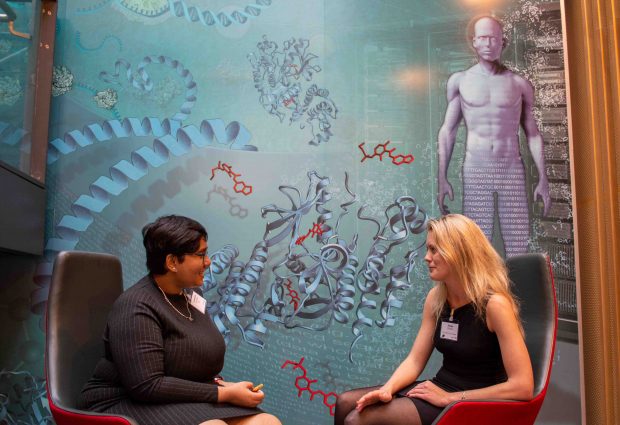
Science date: The Crick meets EMBL
To mark a new collaboration between EMBL and the Francis Crick Institute in London, PhD students from the Crick visited EMBL’s European Bioinformatics Institute. Over the afternoon coffee break, Crick PhD student Emma Colliver and EMBL PhD student Sampurna Mukherjee caught up over coffee

Emma Colliver is a PhD student in Charlie Swanton’s Cancer Evolution and Genome Instability Lab at the Crick.
Sampurna Mukherjee is a PhD student in Andrew Leach’s computational modelling and informatics for drug discovery group at EMBL-EBI.
What did you expect from the meeting?
Emma Colliver: I was looking forward to it. It’s always interesting to hear from someone working in a different scientific discipline and institute – you never know what might turn out to be relevant to your own research and what ideas it might inspire! I think it’s important to remove yourself from your immediate field from time to time.
Sampurna Mukherjee: I expected it to be an interesting experience – and it was! Also, I had no idea if it would be somebody who primarily does ‘wet lab’ work, or a computational biologist like me, so I had geared up for a stimulating chat either way.
What did you know about the other person’s research beforehand?
Emma Colliver: I was fortunate enough to hear Sampurna present her research at the conference just before our date, so I definitely had the advantage there! Sampurna’s work in HLA peptidomics was of relevance given our own lab’s interest in the role of HLA in immune evasion in lung cancer. I knew that Sampurna was also a bioinformatician, so looked forward to hearing about her experience of pursuing a computational PhD.
Sampurna Mukherjee: We hit the jackpot on this. My work on HLA immunology is very closely linked to cancer and Emma’s interest in tumour microenvironments, which ties up with the whole theme of immunology/immunotherapy.
What did you talk about?
Emma Colliver: The conversation was free flowing and wide ranging. We talked about overlaps in our labs’ research priorities, highs and lows of PhD life, and our journeys into doctoral study. We were clearly both passionate about our research topics and about the questions out there to answer.
Sampurna Mukherjee: I would say we had a lovely, animated and spontaneous discussion. We touched on life as a PhD student, on why we do science and how we do it, our lives prior to starting a PhD and everything in between.
Any surprises?
Emma Colliver: Like me, Sampurna had an unusual background prior to embarking on her PhD, having originally trained as a zoologist. It was fascinating hearing about her work researching the population dynamics of an endangered tiger in her native India, and her desire to introduce more rigorous statistics into that field.
Sampurna Mukherjee: Emma is a trained physicist and she worked in charity fundraising before starting a PhD. It was heartening to have met another peer with an unusual background in biology. We also discussed how having worked for another field before starting a PhD gives you more insight into your mind. I wish it were advocated more in academia, with scientists like Emma as an example.
Did you pick up any tips?
Emma Colliver: We both agreed on the importance of well-written documentation in bioinformatics. Ensuring good coding practice, setting up structured folders, and rigorously documenting which analyses have been undertaken are all key as large-scale bioinformatics projects grow organically.
Sampurna Mukherjee: As we are both bioinformaticians, we spoke about good coding practices to ensure reproducible research, as we have both faced difficulties working with poorly documented code. It is a topic that I speak about frequently, and it was great to see that we concur.
Did anything get lost in translation?
Emma Colliver: Not really! I think we spoke a similar language. I know I’d be fascinated to sit down again and hear more about Sampurna’s work as it progresses.
Sampurna Mukherjee: Definitely not. I think our interests and goals are aligned and we see science, especially the realm of bioinformatics, through the same viewfinder.
Can you imagine collaborating in the future?
Emma Colliver: I’m not sure about any immediate collaborations but I’ll certainly be keeping up to date with any publications from Sampurna. We also agreed another trip back to the EMBL campus in Hinxton would be great to put in the diary.
Sampurna Mukherjee: We will probably not have an immediate collaboration, but I can see it happening a few years down the line. Now we’re both aware of each other’s labs, I think we’ll keep an eye on what comes up in future.
This post was originally published on the Francis Crick Institute website.


